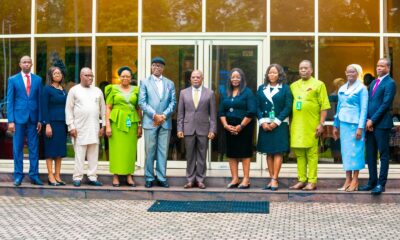Business
Justifying N500bn Manufacturers’ Lifeline
The way he came to power was everything but smooth and so he is trying his best to impress on the people that he is equal to the task which the leadership of a complex country like Nigeria has placed on his shoulders. Hence, the changing of the old order seems to be the major challenge of the Jonathan administration which has so far not spared any stone in its attempt to turn around the fortunes of the common man in Nigeria for good.
It is in pursuit of this challenge that the administration moved to make petroleum products available to ease transportation problems facing the people, a development which has drastically reduced the expletives the common man throws on governments before this administration. Thus, towards reducing the tedium of doing business in Nigeria the federal government recently released the whopping sum of N500 billion to the manufacturing sector to enable major players reactivate moribund and ailing industries to boost the economy. Unveilling the package recently, the Vice President, Arc. Namadi Sambo noted that of the amount, N100 billion is allocated to the textile industry in response to the demands of investors in the sector for financial aid. Already, he said, N40 billion out of the allocation to the textile industry had been disbursed to some investors in the sub-sector.
Mindful of the potentials which the manufacturing sector has in boosting the nations Gross Domestic Product (GDP) and accelerate the diversification of the economy grossly dependent on crude oil export, this plan to revive the manufacturing sector by injecting much needed funds is highly commendable.
However, in view of the high rate of youth unemployment which a robust manufacturing sector could help in redressing, it is hoped that the disbursement of the N500 billion bail-out fund would not be politicised if it must achieve the objective it is set to meet.
This fear was expressed at the 49th annual general meeting of the Nigeria Association of Chambers of Commerce, Industry, Mines and Agriculture, NACCIMA held in Abuja, not too long ago. At that forum, NACCIMA lamented the dwinding fortunes of the nation’s industrial sector. Reviewing the economy, stakeholders decried the drop in industrial capacity to an average of 36 per cent in May 2009. In his articulation of NACCIMA view, its president, Dr Simon Chukwuemeka Okolo blamed the decline in industrial capacity utilisation to the poor operating environment especially very low credit access by operators and infrastructural decay. Okolo observed the initial N70 billion Textile Fund and the N200 billion Special Agric Fund which were aimed at developing the real sector were yet to show desired positive impact on the economy.
“Therefore, government should as a matter of urgency address the current character of credit allocation which shows high degree of disconnection of the financial system from the real sector of the economy,” Okolo observed.
In fact, Okolo advocated the setting up of sector specific development banks like in other countries to restore the real sector as the driving force of the economy and the need to engage the private sector through the Public Private Partnership (PPP) approach by putting in place the appropriate machinery and strategic framework to develop the real sector to enable it drive the economy cannot be over-emphasised.
All said, government’s gesture towards the manufacturing sector and the textile industry in particular is aimed at employment generation for Nigerians. For instance, the textile industry in its hey days in the 1980’s had over 70 firms which together employed over 500,000 workers. Today, the industry, a mere shadow of its original self has no more than 20 firms still in operation with just over 20,000 employees, hence the interest of government in revamping the textile industry which is a major employer of labour.
Besides, Okolo who is also a member of the Presidential Advisory Council (PAC) urged the Federal Government to endeavour to diversify the revenue base of the country through serious encouragement of non-oil exports in the country, stressing that unemployment has continued to soar in the country with dwindling revenue inducing budgetary constraints for the federal government. He then urged the federal government to improve the country’s investment climate to encourage development of industries that will boost production of goods for local consumption and ease the unemployment situation in the country. It follows that the totality of federal government policies must be aimed at boosting local industries which in turn would address the unemployment problem in the country.
Clearly, the glut in the labour market has rubbed off negatively on even the few that are employed. This is why in its ranking of living condition around the world, the United States based Newsweek Magazine judged Nigeria to be second to the worst. The analysis examined factors such as education, healthcare, quality of life, economic dynamism, political environment, the proportion of employed people in the population and industrial output. That government is sensitive to these issues could be gleamed from the ongoing revolution in the manufacturing and power sectors. The solution to the inadequacy of power and energy is considered extremely necessary as the epileptic power outage in most parts of the country has not only created untold hardship for the citizenry but has led to low capacity utilisation of manufacturers as well as reduced productivity of the real sector operators who depend on private provision of alternative sources of electricity through power generators, thereby making the cost of doing business in the country very high. The task to release the country from the vice grip of retrogressive elements has come and the Jonathan/Sambo government needs all the support it could muster to drive the economy. With a buoyant ceremony and near full employment for youths the scourge of militancy in the Niger Delta region and the uprising by youths in the Boko Haram sect would be a thing of the past.
Business
NCDMB, Dangote Refinery Unveil JTC On Deepening Local Content

Business
Industry Leaders Defend Local Content, … Rally Behind NCDMB

Business
Replace Nipa Palms With Mangroove In Ogoni, Group Urges FG, HYPREP

-
Business1 day ago
2027: Group Vows To Prevail On Diri To Dump PDP For APC
-
City Crime24 hours ago
RSG Tasks Federal Government On Maternal Deaths
-
News1 day ago
South-South Contributes N34trn To Nigeria’s Economy In 2024 – Institute
-

 Featured22 hours ago
Featured22 hours agoRivers A Strategic Hub for Nigeria’s Blue Economy -Ibas …Calls For Innovation-Driven Solutions
-

 Rivers1 day ago
Rivers1 day agoNDDC Inaugurates Ultra-Modern Market In Rivers Community
-
Opinion1 day ago
Welcome! Worthy Future For R/S
-
News24 hours ago
Nigeria’s Inflation Rate Dropped To 22.22% In June -NBS
-
News1 day ago
NOA Set To Unveil National Values Charter — D-G

